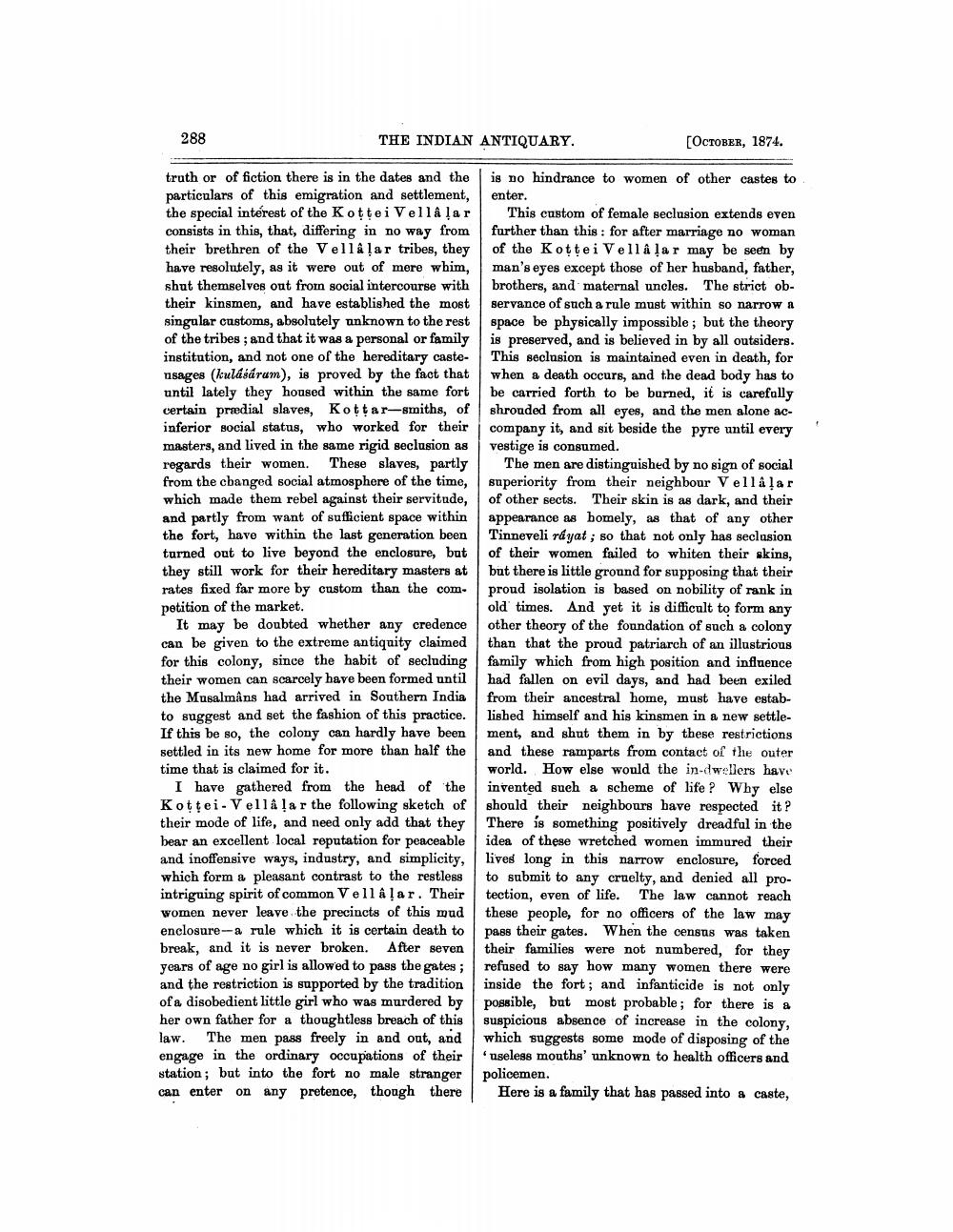________________
288
THE INDIAN ANTIQUARY.
[OCTOBER, 1874.
truth or of fiction there is in the dates and the is no hindrance to women of other castes to particulars of this emigration and settlement, enter. the special interest of the Kottei Vellalar This custom of female seclusion extends even consists in this, that, differing in no way from further than this : for after marriage no woman their brethren of the Vellalar tribes, they of the Kotte i Vellalar may be seen by have resolutely, as it were out of mere whim, | man's eyes except those of her husband, father, shut themselves out from social intercourse with brothers, and maternal uncles. The strict obtheir kinsmen, and have established the most servance of such a rule must within so narrow a singular customs, absolutely unknown to the rest space be physically impossible ; but the theory of the tribes; and that it was a personal or family is preserved, and is believed in by all outsiders. institution, and not one of the hereditary caste- This seclusion is maintained even in death, for usages (kulásárum), is proved by the fact that when a death occurs, and the dead body has to until lately they housed within the same fort be carried forth to be burned, it is carefully certain predial slaves, Kottar-smiths, of shrouded from all eyes, and the men alone acinferior social status, who worked for their company it, and sit beside the pyre until every masters, and lived in the same rigid seclusion as vestige is consumed. regards their women. These slaves, partly The men are distinguished by no sign of social from the cbanged social atmosphere of the time, superiority from their neighbour Vellalar which made them rebel against their servitude, of other sects. Their skin is as dark, and their and partly from want of sufficient space within appearance as homely, as that of any other the fort, have within the last generation been Tinneveli ráyat; so that not only has seclusion turned out to live beyond the enclosure, but of their women failed to whiten their skins, they still work for their hereditary masters at but there is little ground for supposing that their rates fixed far more by custom than the com- proud isolation is based on nobility of rank in petition of the market.
old times. And yet it is difficult to form any It may be doubted whether any credence other theory of the foundation of such a colony can be given to the extreme antiquity claimed than that the proud patriarch of an illustrious for this colony, since the habit of secluding family which from high position and influence their women can scarcely have been formed until had fallen on evil days, and had been exiled the Musalmans had arrived in Southern India from their ancestral home, must have estabto suggest and set the fashion of this practice. lished himself and his kinsmen in a new settleIf this be so, the colony can hardly have been ment, and shut them in by these restrictions settled in its new home for more than half the and these ramparts from contact of the outer time that is claimed for it.
world. How else would the in-dwellers have I have gathered from the head of the invented such a scheme of life? Why else Kottei - Vellala r the following sketch of should their neighbours have respected it? their mode of life, and need only add that they There is something positively dreadful in the bear an excellent local reputation for peaceable idea of these wretched women immured their and inoffensive ways, industry, and simplicity, lives long in this narrow enclosure, forced which form a pleasant contrast to the restless to submit to any cruelty, and denied all prointriguing spirit of common Vellalar. Their tection, even of life. The law cannot reach women never leave the precincts of this mud these people, for no officers of the law may enclosure--a rule which it is certain death to pass their gates. When the census was taken break, and it is never broken. After seven their families were not numbered, for they years of age no girl is allowed to pass the gates; refused to say how many women there were and the restriction is supported by the tradition inside the fort; and infanticide is not only of a disobedient little girl who was murdered by possible, but most probable; for there is a her own father for a thoughtless breach of this suspicious absence of increase in the colony, law. The men pass freely in and out, and which suggests some mode of disposing of the engage in the ordinary occupations of their useless mouths' unknown to health officers and station; but into the fort no male stranger policemen. can enter on any pretence, though there Here is a family that has passed into a caste,




